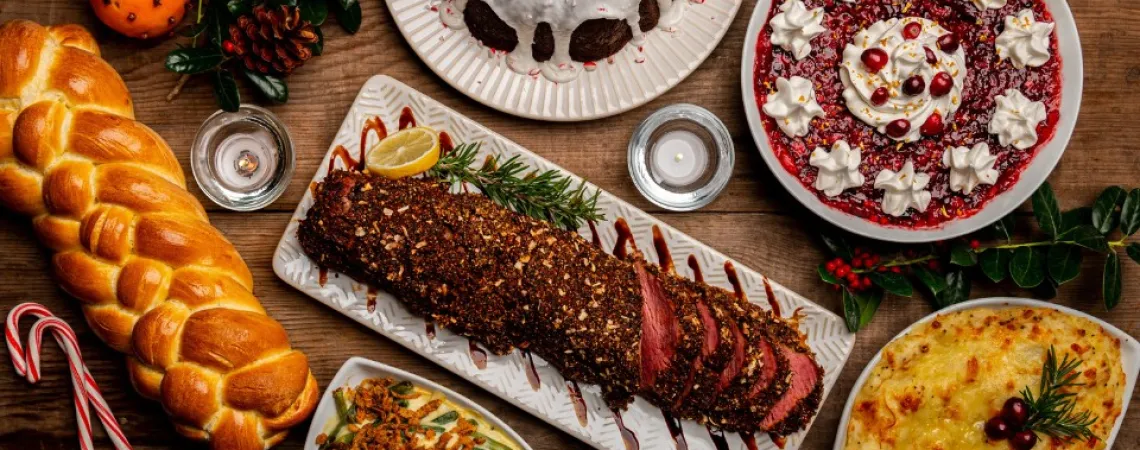
The holiday season is a precious time to share delicious meals and warm moments with loved ones. However, this abundance can sometimes pose a challenge, especially for those on a journey to lose weight or maintain their current weight.
How can you balance pleasure and moderation without feeling overwhelmed? Here are five common holiday challenges, along with practical advice from our registered dietitians to help you approach them with ease.
1. The Buffet Challenge: Managing Abundance Without Overindulging
The Situation:
You’re invited to a Christmas buffet. To “make the most” of the meal, you decide to eat very little during the day or even skip meals entirely.
The Consequences:
- Lack of energy: Skipping meals can leave you fatigued, irritable, or even with a headache, making it hard to enjoy the event.
- Overeating: Arriving hungry often leads to eating too quickly, missing hunger and fullness cues, and consuming more than needed.
What You Can Do:
Stick to a regular meal schedule throughout the day:
- In the morning, choose a nourishing breakfast with protein-rich foods (e.g., eggs, Greek yogurt), complex carbohydrates (e.g., whole-grain bread, oats), and healthy fats (e.g., nuts or avocado).
- For lunch, have a complete but light meal with a generous portion of vegetables, lean protein, and fibre-rich starches (e.g., legumes, brown rice, or buckwheat).
- If dinner is late, consider an afternoon snack to avoid arriving at the buffet overly hungry. A piece of fruit with a few nuts or a slice of cheese are good options.
2. "Forbidden Foods": Rediscovering the Joy of Eating

The Situation:
At the buffet, you focus only on the lowest-calorie options, deliberately avoiding richer or sweeter dishes you actually crave.
The Consequences:
- Frustration and dissatisfaction: You may feel regret or frustration from not tasting foods you desired, potentially leading to overeating later to compensate for the restriction.
- Restrictive mindset: Over-focusing on “good” or “bad” foods can create a rigid view of eating, which isn’t sustainable or kind to yourself.
What You Can Do:
Listen to your cravings and take a more intuitive approach:
- Serve yourself the foods that genuinely appeal to you, regardless of how “healthy” they are.
- Savour each bite and periodically ask yourself, “Am I still hungry?”
- When you notice the flavours aren’t as enjoyable as they were at the start or that you wouldn’t mind setting your plate aside, that’s likely a good time to stop.
3. Lack of Physical Activity: Moving in New Ways

The Situation:
You spend several days with family, away from your regular exercise routine. You begin to worry that this break will disrupt your progress.
The Consequences:
- Unnecessary stress: Worrying may prevent you from fully enjoying time with your loved ones.
- Narrow view of physical activity: If exercise is seen only as a way to “burn calories,” you might overlook its other benefits, like stress relief, improved sleep, and overall well-being.
What You Can Do:
Use this time to explore different and enjoyable winter activities:
- Try skating, skiing, snowshoeing, cross-country skiing, fat biking, a forest hike, or even a game of hockey. These winter activities combine fun and movement while embracing the season.
- Engage in simple, everyday activities like climbing back up the hill after tobogganing, shovelling snow, or carrying firewood. These tasks are effective ways to stay active too.
4. Imposed Foods: Learning to Say No Kindly

The Situation:
A loved one insists you try their homemade dessert, but you’re already full. Out of politeness or to avoid disappointing them, you accept.
The Consequences:
- Reduced enjoyment: Eating a dessert when you’re not hungry diminishes the experience and may lead to consuming more than your body needs without fully enjoying it.
- Implicit frustration: Giving in under pressure may cause frustration with yourself or the person insisting.
What You Can Do:
Learn to say no with kindness:
- Simply explain that you’re too full at the moment but would love to take some home for later.
- Often, this suggestion is well-received, and your loved one may even enjoy preparing a portion for you to enjoy another time.
5. Guilt After Overindulging: Letting Go

The Situation:
You ate a richer dish or dessert than planned and feel guilty afterward for not sticking to your intentions.
The Consequences:
- Unnecessary guilt: Feeling guilty doesn’t change what you ate and can foster a negative relationship with food.
- Long-term effects: Excessive rigidity can lead to cycles of restriction and overeating.
What You Can Do:
Remind yourself that enjoying a treat occasionally won’t derail your goals. One meal or dessert isn’t going to define your overall health or weight:
- Get back to your usual habits as soon as possible: balanced meals, physical activity, hydration, and rest.
- Allow yourself to enjoy the moment without judgement. Long-term balance is the key to success.
Balance at the Heart of the Holidays

The holiday season is a short time of the year. Instead of focusing on restrictions, pay attention to your hunger and fullness cues. Savour each meal, cherish joyful moments with your loved ones, and move your body in ways that feel good to you.
If you’d like more support in adopting a balanced approach, book an appointment with a registered dietitian nutritionist from TeamNutrition.
We wish you a joyful holiday season! May this time be filled with pleasure, relaxation, and, most importantly, wonderful moments shared with your loved ones.






